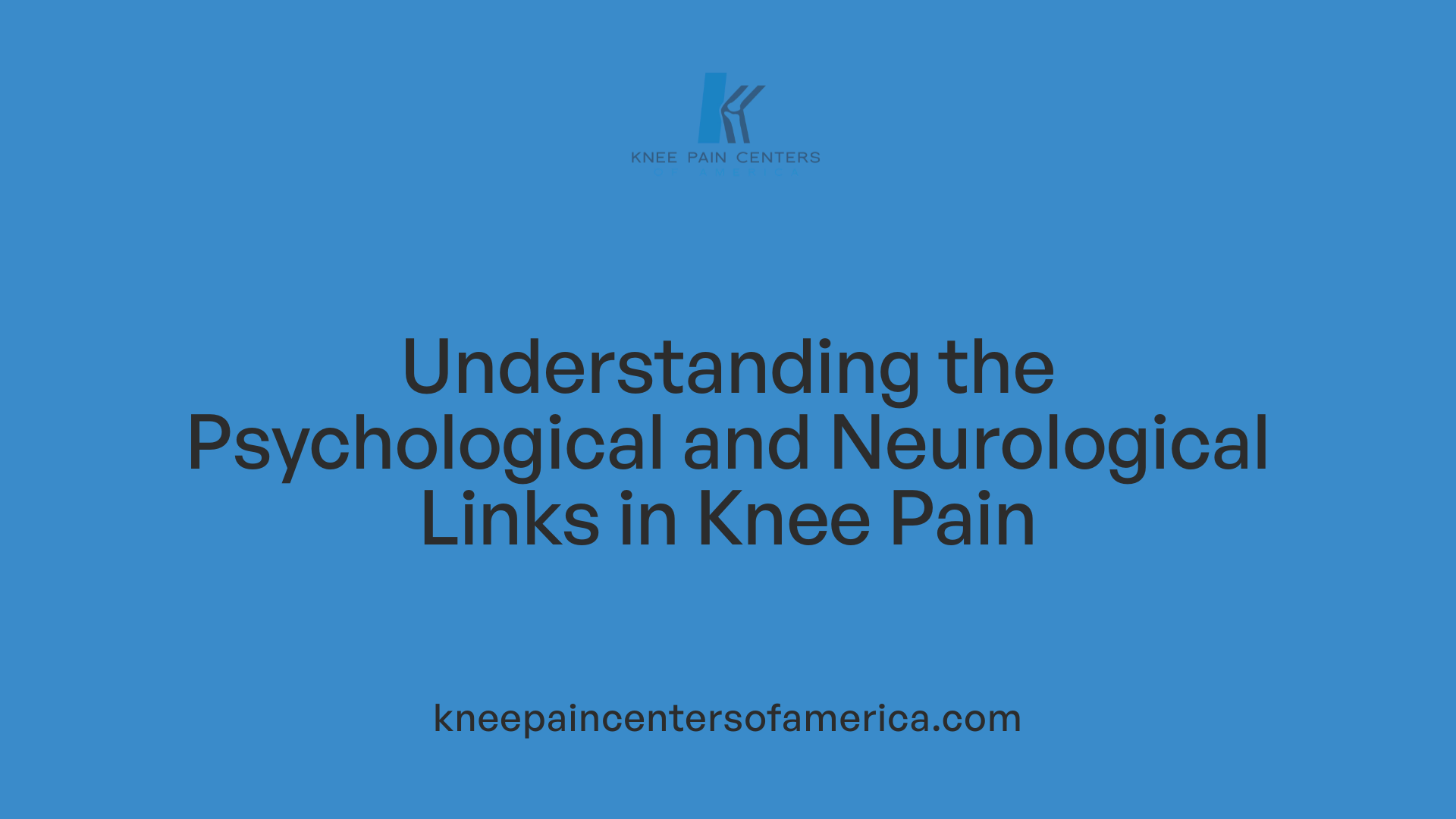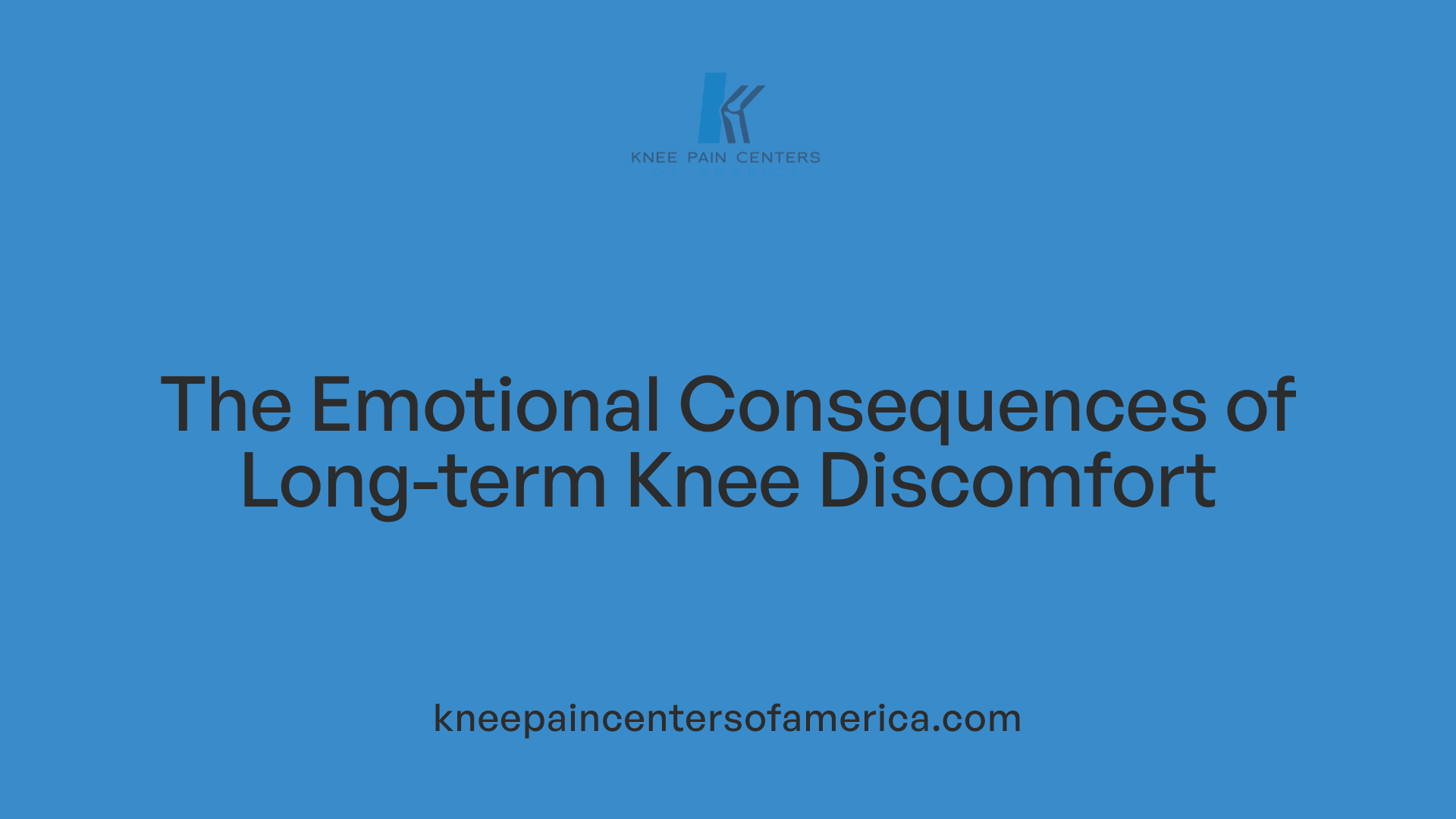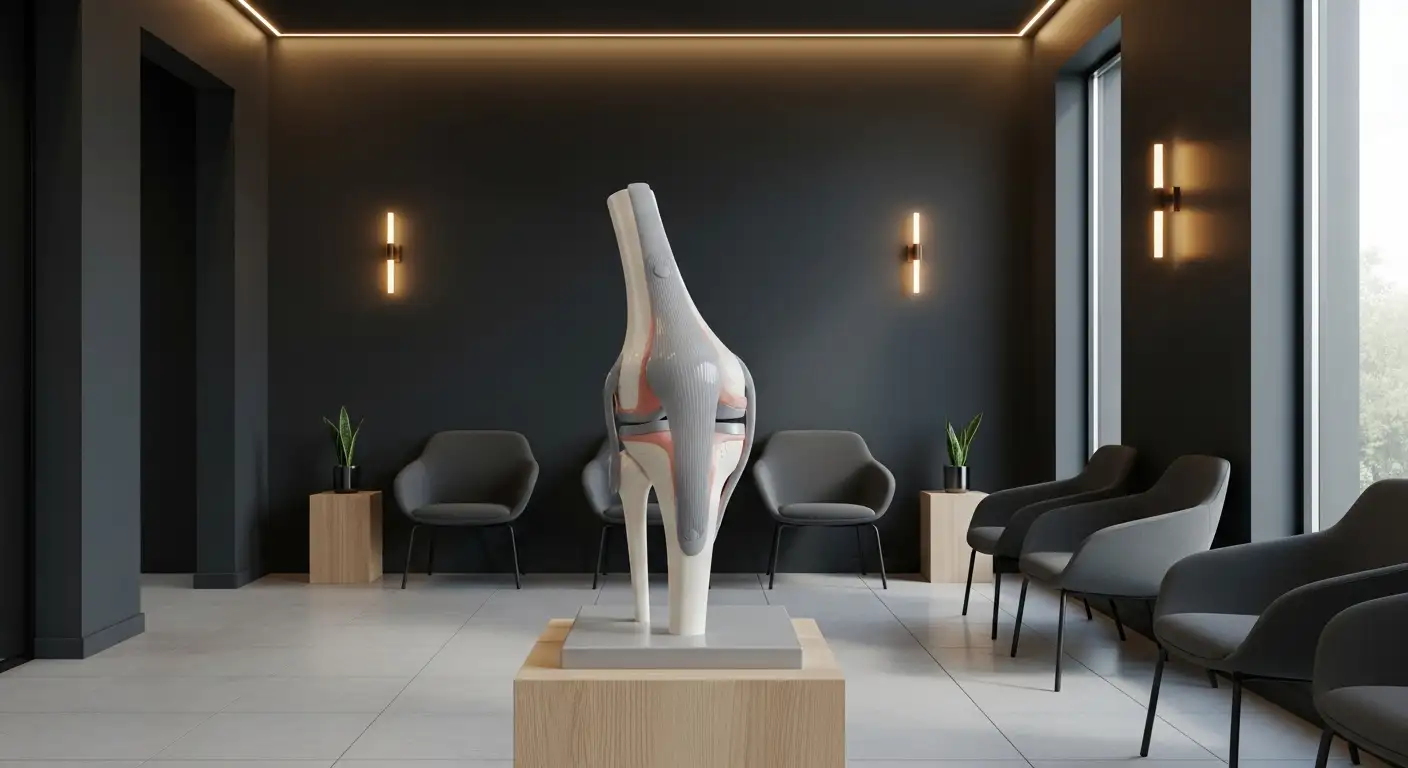Understanding the Deep Impact of Knee Pain on Life and Relationships
Knee pain, particularly from conditions like osteoarthritis, extends far beyond physical discomfort. It significantly influences individuals' social interactions, mental health, and their close relationships. Chronic pain can lead to social withdrawal, emotional distress, and strained relationships, creating a complex web of biopsychosocial challenges. This article explores how knee pain impacts social life and relationships, the psychological effects involved, and strategies for holistic management.
The Interplay of Knee Pain and Social Engagement
How does knee pain impact social life and relationships?
Chronic knee pain can have a profound effect on a person’s social life and emotional well-being. Due to physical discomfort and reduced mobility, individuals often withdraw from social activities, leading to feelings of social isolation and loneliness. This withdrawal can interfere with everyday interactions, family roles, and leisure pursuits.
Many report avoiding social gatherings, sports, and community events because of pain or physical restrictions. These limitations not only diminish social participation but also strain relationships within families and romantic partnerships. Feelings of frustration, anxiety, and depression become common, especially as the emotional toll of ongoing pain increases.
Research indicates that psychological stress compounds this issue. Individuals experiencing higher stress levels face a threefold increased risk of developing or exacerbating chronic knee pain. The emotional distress linked with persistent pain can lead to irritability, withdrawal, and feelings of guilt, further distancing individuals from their social support networks.
Studies examining osteoarthritis of the knee highlight the bidirectional connection between pain and mental health. Pain can affect mood, which in turn influences social interactions, creating a cycle that is challenging to break. This interplay underscores the importance of holistic treatment approaches that address both physical symptoms and emotional health.
Overall, knee pain extends beyond the physical symptoms, deeply impacting mental health and relationships. Addressing the psychological and social consequences is crucial for improving quality of life in those affected.
Knee Osteoarthritis and Social Life: A Closer Look
How does osteoarthritis affect someone socially?
Osteoarthritis of the knee can profoundly impact a person’s social life. The joint pain and limited mobility often prevent individuals from engaging fully in social activities, hobbies, or outings they once enjoyed. This physical restriction makes it challenging to participate in sports, attend social gatherings, or even perform daily tasks comfortably.
As a result, many people experience social withdrawal, feelings of loneliness, and isolation. The pain can also cause emotional distress, such as anxiety, depression, and frustration, which further discourages social interactions. Some individuals rely on assistive devices or need help from caregivers, which may impact their sense of independence and self-esteem.
The combination of physical limitations and emotional struggles reduces opportunities for social contact and diminishes overall quality of life. These barriers not only affect day-to-day interactions but also strain relationships with family and friends, leading to feelings of being misunderstood or disconnected.
In summary, osteoarthritis affects social well-being by restricting physical activity, fostering emotional challenges, and decreasing social participation, all of which can negatively influence an individual’s mental health and life satisfaction.
Mental Health and Chronic Knee Pain: The Bidirectional Relationship

What is the relationship between knee pain and mental health conditions such as stress, depression, and anxiety?
Research indicates a complex connection between chronic knee pain and mental health issues, particularly stress, depression, and anxiety. Psychological stress has been linked to a significantly increased risk of developing persistent knee pain. For instance, severe stress can elevate the likelihood of chronic knee pain by over three times compared to lower stress levels, largely due to neuroendocrine changes such as increased cortisol production.
Depression stands out as strongly associated with knee pain. Multiple studies and clinical trials have shown that individuals experiencing depression often report higher levels of knee discomfort. Interestingly, treatments like antidepressants have proven effective in reducing knee pain, highlighting the biological interplay between mood and physical pain. The mechanisms behind this include inflammatory cytokine alterations, dysregulation of the autonomic nervous system, and changes within the hypothalamic-pituitary-adrenal axis.
When it comes to anxiety, evidence is less conclusive. High-quality studies generally suggest no direct link between anxiety disorders and knee pain. However, elevated anxiety can heighten pain perception and vulnerability to pain onset, possibly through neural pathways involving astrocyte activation and brain regions responsible for pain modulation.
The relationship between knee pain and mental health problems is bidirectional. Chronic pain can lead to emotional issues like frustration, depression, and social withdrawal. Conversely, existing mental health conditions can intensify pain perception, creating a cycle that complicates recovery and daily functioning. This dynamic underscores the importance of adopting a biopsychosocial approach in managing knee osteoarthritis, integrating psychological support alongside physical treatments.
Understanding this interconnectedness emphasizes that addressing mental health is crucial in alleviating knee pain and improving overall quality of life. Integrating strategies such as cognitive-behavioural therapy (CBT), mindfulness, and social support can help break the cycle, providing relief from both physical symptoms and emotional distress.
Psychological Effects of Living with Knee Injury and Chronic Pain
What are the psychological effects of knee injury?
Knee injuries often extend their impact beyond physical discomfort, significantly affecting mental health. Many individuals experience heightened anxiety and depression after suffering a knee injury. These emotional responses stem from limitations in mobility, persistent pain, and concerns about future health and independence. The psychological toll can diminish quality of life, making social interactions, work, and daily activities more challenging.
Furthermore, fear of re-injury can dominate the mind, discouraging activity and complicating recovery. This fear not only hampers physical rehabilitation but also leads to emotional distress, fostering a cycle of frustration and helplessness.
Chronic pain associated with knee conditions can cause ongoing mental health issues. Feelings of hopelessness, frustration, and loss of purpose often emerge when pain persists or worsens, affecting mood and overall well-being.
Addressing these psychological challenges is vital. Incorporating mental health support, such as counseling or cognitive behavioral therapy, is proven to help improve emotional resilience. Combining such approaches with medical interventions enhances the likelihood of successful recovery and better management of living with knee injury and pain.
Emotional Toll of Chronic Knee Pain and Its Ripple Effect on Relationships

Do stress or emotional factors cause or worsen knee pain?
Yes, stress and emotional factors can play a significant role in the development and intensification of knee pain. When individuals experience chronic stress or anxiety, their bodies respond by releasing hormones such as cortisol, which can lead to neuroendocrine changes. These changes may contribute to systemic inflammation and muscle tension, both of which can intensify joint discomfort.
Research indicates that elevated anxiety levels and emotional distress are linked to heightened pain sensitivity. For example, individuals with high stress levels are more likely to perceive their knee pain as more severe. Moreover, some studies suggest that stress-related immune system dysfunction may even trigger or accelerate autoimmune processes that damage joint tissues, exacerbating conditions like osteoarthritis.
Managing emotional health through relaxation techniques, mindfulness, physical activity, and social support can help mitigate these effects. Such strategies not only improve mental well-being but also have the potential to reduce inflammation and joint pain, promoting better overall joint health.
This complex relationship underscores that addressing psychological factors is crucial in holistic knee pain management, as stress and emotional factors can directly influence physical health and pain perception.
Psychological Strategies and Support Networks for Managing Knee Pain

What are the psychological coping strategies and interventions for social and relational well-being in knee pain sufferers?
Living with chronic knee pain often impacts emotional and social well-being. To cope effectively, many individuals turn to psychological strategies that help manage pain perception and emotional distress. Mindfulness practices, such as meditation and deep-breathing exercises, help individuals stay present and reduce anxiety related to their pain. Cognitive restructuring techniques encourage reframing negative thoughts, promoting a more positive outlook and reducing catastrophizing about pain.
Reducing pain-related fear and promoting behavioral activation are also beneficial. These methods motivate individuals to gradually re-engage in daily activities despite discomfort, preventing social withdrawal. Strengthening social support networks plays a vital role; support groups offer valuable platforms for sharing experiences, gaining practical advice, and emotional encouragement. Engaging with peers who understand the challenges of knee pain helps reduce feelings of isolation.
Building resilience and self-efficacy through practices such as expressing gratitude, setting realistic goals, and maintaining a positive mindset can empower individuals to better manage their condition. These psychological approaches, combined with early professional intervention, physical activity, and social engagement, contribute significantly to maintaining mental health and preserving interpersonal relationships. Regular participation in support groups and psychological therapy can improve coping skills, foster emotional resilience, and ultimately enhance quality of life for those experiencing chronic knee pain.
How do social support and community involvement influence pain management?
Social support influences pain perception and mental health outcomes in knee pain sufferers. Positive social interactions can elevate mood and provide a sense of belonging, which mitigates pain-related distress. Conversely, extensive solicitous support—although generally well-intentioned—can sometimes increase pain perceptions. Therefore, evening interactions with understanding and supportive social partners are crucial.
Community involvement, including peer-led groups or support organizations, offers valuable opportunities for shared learning and emotional reassurance. These support networks encourage persistence with treatment regimens and promote healthier coping mechanisms. The use of tools like ecological momentary assessments (EMAs) has facilitated understanding how real-time social contact affects pain levels, revealing that social support can both alleviate and occasionally intensify pain depending on the context.
Incorporating social support into pain management strategies fosters resilience, reduces feelings of social isolation, and enhances overall well-being. Encouraging open communication and fostering supportive relationships are essential steps toward holistic management of knee pain.
Impact of Knee Pain on Sexual Relationships and Intimacy

How does knee pain affect personal relationships and social engagement?
Chronic knee pain can significantly influence an individual's ability to engage in social and intimate activities. Many people report that their joint discomfort leads to a reduction in physical activities, including sexual intimacy. This decrease in physical closeness and desire often results in emotional strain, frustration, and decreased relationship satisfaction.
Knee pain can cause emotional responses such as irritability, mood swings, and feelings of depression, all of which may hinder open communication between partners. These emotional challenges may create a cycle where pain and psychological distress reinforce each other, further impacting the quality of relationships.
Support from partners plays a vital role in coping with these challenges. Emotional understanding, patience, and assistance with daily routines can help alleviate some relational tension. Medical treatments to manage pain, coupled with psychological strategies like counseling or therapy, are also effective in improving intimacy and overall social interactions.
Addressing physical pain not only improves mobility but can also positively influence emotional health, leading to better communication and stronger bonds in personal relationships.
Effects on sexual activity and desire
Physical limitations caused by knee pain often lead to a notable decrease in sexual activity and desire. Many individuals feel reluctant or unable to engage fully in intimacy due to discomfort or fear of worsening their condition. This can result in feelings of guilt, frustration, and decreased self-esteem, which further impacts intimacy.
Limited mobility and weight-bearing difficulties may physically restrict certain sexual positions or activities, prompting couples to seek alternative ways to maintain closeness. Open dialogue about needs, preferences, and limitations is essential in adapting intimacy to the individual's condition.
By managing pain effectively and fostering supportive communication, couples can find new ways to connect emotionally and physically. Psychological support and lifestyle adjustments often help restore intimacy and improve relationship satisfaction despite ongoing knee issues.
| Aspect | Impact | Additional Notes |
|---|---|---|
| Physical limitations | Reduced sexual activity | Discomfort may hinder participation in certain positions |
| Emotional health | Mood swings, frustration | Can lead to withdrawal and decreased intimacy |
| Communication | Strained relationships | Needs openness and support strategies |
| Partner support | Emotional and practical help | Enhances relationship resilience |
| Treatment and management | Improved mobility and mood | Leads to better social and intimate life |
Understanding and addressing the multifaceted effects of knee pain on personal relationships is vital. Combining medical care with emotional and social support can help maintain intimacy and strengthen bonds, even in the face of chronic discomfort.
Racial Disparities and the Biopsychosocial Model of Knee Pain
How do racial disparities influence social and mental health outcomes in knee osteoarthritis?
Racial disparities significantly impact both the physical and emotional experiences of individuals with knee osteoarthritis. Research indicates that Black people with this condition tend to report higher levels of pain and more depressive symptoms compared to their White counterparts. These differences are partly due to disparities in pain management, where stereotypes and less personalized healthcare contribute to inadequate treatment.
Societal factors further exacerbate these disparities. For instance, safety concerns and reduced encouragement from healthcare providers can lead to lower levels of physical activity among Black patients. These social determinants negatively influence mental health and overall quality of life.
Racial disparities don’t just affect pain perception; they also influence broader psychological wellbeing. Black individuals often face additional barriers to accessing supportive care and social resources that are critical for managing chronic pain. This interplay of social, cultural, and healthcare factors results in a lower health-related quality of life (HR-QOL) for Black populations suffering from knee osteoarthritis.
Addressing these disparities requires a move toward personalized and culturally sensitive care. Healthcare providers should be aware of systemic biases and actively work to create more inclusive treatment plans. Implementing strategies to reduce inequalities can improve both social connections and mental health outcomes for minority groups dealing with chronic knee pain.
Sociocultural Influences on Pain Perception and Management
Cultural beliefs and social norms shape how individuals perceive and cope with pain. In many communities, pain might be under-recognized or dismissed, affecting how people seek treatment. Socioeconomic factors such as income, education level, and neighborhood safety can also inhibit engagement in physical activity and social support networks.
In terms of management, culturally appropriate education about pain and tailored interventions can help improve adherence to treatment plans. Community outreach programs and healthcare provider training in cultural competence are steps toward more equitable care.
The importance of personalized, inclusive care
Effective management of knee osteoarthritis, especially among racially diverse populations, hinges on personalized treatment that respects cultural differences and individual needs. Inclusive care should involve engaging patients in shared decision-making, addressing implicit biases, and providing equitable access to resources.
By embracing a biopsychosocial approach—considering biological, psychological, and social factors—healthcare providers can better understand and treat the complex nature of chronic knee pain. This approach fosters more positive health outcomes, reduces disparities, and improves quality of life across diverse patient groups.
| Aspect | Impact | Strategies for Improvement |
|---|---|---|
| Pain Severity | Higher in Black patients | Culturally tailored pain management plans |
| Mental Health | Increased depression risk | Screening and culturally sensitive therapy |
| Social Factors | Reduced social support | Community engagement and outreach |
| Healthcare Access | Disparities in treatment | Bias reduction and equitable resource distribution |
| Overall Quality of Life | Lower in minority groups | Personalized, inclusive healthcare models |
Understanding and addressing these racial disparities within the broader biopsychosocial model of knee pain are essential steps toward achieving health equity and improving outcomes for all patients.
The Role of Self-Efficacy and Social Support in Managing Knee Pain
What is the relationship between social support, self-efficacy, and self-management in knee osteoarthritis?
Social support plays a crucial role in how individuals manage their knee osteoarthritis. When patients perceive that they have strong social backing from family, friends, or healthcare providers, it often leads to better self-management behaviors. This support can come in various forms, such as emotional encouragement, practical assistance, or informational guidance.
Part of this process involves self-efficacy, which is a person's belief in their ability to manage their condition. Research indicates that higher levels of self-efficacy are associated with more consistent pain management, medication adherence, and engagement in beneficial lifestyle changes like exercise.
Enacted social support—actual support received from loved ones or professionals—directly influences self-management activities. It helps foster confidence, making individuals feel more capable of handling their symptoms and adhering to prescribed routines.
Enhancing social support networks and boosting self-efficacy can significantly improve how patients cope with their condition. These elements encourage proactive health behaviors, contribute to better physical and mental health, and can lessen feelings of frustration or helplessness associated with chronic knee pain.
Overall, fostering robust social connections and empowering patients through confidence-building strategies are vital in effective knee pain management, leading to improved quality of life and reduced emotional distress.
Integrating Holistic Approaches for Better Outcomes

How can psychological support and physical health strategies work together to improve outcomes?
A comprehensive approach to managing chronic knee pain involves addressing both physical symptoms and psychological well-being. Combining psychological support with physical health strategies can significantly improve overall results for individuals suffering from conditions like osteoarthritis.
Multidisciplinary treatment strategies often include physical therapies such as exercise programs, medications, and lifestyle modifications. These address the physical limitations and reduce pain levels. Concurrently, mental health interventions such as cognitive-behavioral therapy (CBT), mindfulness, and social support networks target emotional distress, reduce pain catastrophizing, and promote resilience.
Early intervention proves particularly valuable. When psychological support begins promptly, it can mitigate feelings of frustration, anxiety, and depression. Maintaining this supportive connection helps individuals better cope with ongoing symptoms and enhances their social participation.
Research indicates that integrating these approaches leads to improved quality of life. Patients report better mood, stronger relationships, and increased confidence in activity management. The collaborative efforts of healthcare providers—ranging from physiotherapists and physicians to mental health specialists—instill a sense of control, reducing feelings of isolation and helplessness.
What are the benefits of a combined physical and psychological therapy approach?
By addressing both the mind and body, combined therapies foster emotional resilience and physical functioning. This holistic care paradigm reduces reliance on medications, minimizes disability risk, and promotes sustained activity levels.
In summary, the synergy of psychological support and physical health strategies offers a more effective pathway for managing chronic knee pain. It not only alleviates symptoms but also empowers individuals to lead fuller, more engaged lives despite their condition.
Conclusion: A Call for Compassionate, Inclusive Care
Understanding the multifaceted nature of chronic knee pain is essential for effective management and improved quality of life. It is clear that the experience of knee pain is not purely physical but is deeply interconnected with psychological and social factors. Psychological stress has been shown to significantly increase the risk of chronic knee pain, with severe stress tripling the likelihood of developing the condition. This relationship persists even after accounting for other variables such as age, obesity, and lifestyle, emphasizing the importance of addressing mental health alongside physical treatment.
Biopsychosocial factors influence pain perception and progression. Neuroendocrine changes, particularly cortisol dysfunction caused by chronic stress, can lead to systemic tissue degeneration, inflammation, and heightened pain sensitivity. Furthermore, mental health conditions like depression are closely linked to knee pain, often exacerbating perceptions of discomfort and reducing motivation for physical activity. Conversely, positive social interactions and social support are associated with better mood, resilience, and a dampened pain-depression link, highlighting the importance of social well-being.
Living with chronic knee pain often results in emotional distress, social withdrawal, and a diminished sense of independence. Many individuals experience frustration, anxiety, and depression, which reinforce the cycle of pain and emotional suffering. Support from partners and involvement in support groups can foster emotional resilience and help manage these psychological challenges.
To provide effective care, it is crucial to adopt a comprehensive, personalized approach. Treatments should encompass not only physical therapies, medications, or surgical options but also psychological interventions such as cognitive-behavioral therapy and mindfulness practices. These strategies can reduce pain catastrophizing, fear, and emotional distress.
Fostering mental and social well-being is integral to comprehensive knee osteoarthritis care. Developing treatment plans that recognize individual needs, cultural backgrounds, and social circumstances can lead to better outcomes and enhance overall quality of life. As research continues, integrating biopsychosocial perspectives into standard care will be vital in addressing the full scope of challenges posed by chronic knee pain.
Moving Forward with Support and Understanding
Knee pain affects more than just physical health; it deeply influences emotional well-being and social relationships. By recognizing the biopsychosocial nature of knee conditions, healthcare professionals and individuals can work together to develop personalized, inclusive strategies that address pain, mental health, and social needs. Emphasizing support, resilience, and early intervention can significantly improve quality of life, sustaining meaningful personal connections and social participation.
References
- Association between Chronic Knee Pain and Psychological Stress ...
- The impact of social interactions and pain on daily positive and ...
- Are depression, anxiety and poor mental health risk factors for knee ...
- The Psychological Impact of Living with Chronic Knee Pain
- New National Survey Uncovers the Surprising Impact that Knee and ...
- The Psychological Impact of Knee Pain on Mental Health and ...
- Differences in Health-Related Quality of Life Among Subjects ... - jospt
- How Knee Pain & Back Pain Can Affect Your Love Life?
- A qualitative study of the consequences of knee symptoms - BMJ Open





